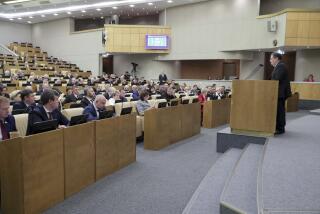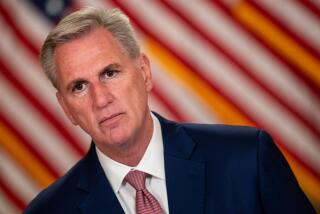Uzbeks’ Budget Rejection Unprecedented, Tass Says
- Share via
MOSCOW — Legislators in Uzbekistan have rejected a budget plan from the republic’s leadership and written their own, Tass said Tuesday.
“This is without precedent,” the official Soviet news agency said in reporting the action.
The opposition shown by a majority of the Uzbek legislators came less than two months after 31 of 1,500 deputies to the national Supreme Soviet made history by casting the first “no” votes in that body in more than 60 years.
Tass gave neither the date nor the breakdown of the vote in the region in Central Asia. It said the Uzbek Supreme Soviet rejected the republic leadership’s budget for 1989 because legislators decided it underestimated the production capacity of government-owned industry by hundreds of millions of rubles.
The Uzbek legislators found “unreasonably low plan targets for many industries,” Tass reported. After calling various industry ministers to committee meetings, it worked out an entirely new budget that increased industrial output by $477 million.
The agricultural plan was boosted by $272 million, Tass said.
The deputies shifted tens of millions of dollars from construction of new industry to housing--in extremely short supply throughout the Soviet Union--schools and hospitals, Tass said. Funding also rose for social and ecological programs, it said.
Legislators found that Uzbek industry could make up for the lost funding through better management, advanced technology and support for initiative, Tass said.
These same deputies previously “read a draft plan on the eve of the session, discussed it quickly and formally at the session and ‘unanimously’ approved it,” Tass said.
“They invariably counted on the republic’s council of ministers to correct possible mistakes,” the news agency said.
The Uzbek legislature now has 12 committees working between sessions to solve political, social and economic problems, Tass said.
Many Uzbek leaders have been arrested in the past year in a corruption scandal in which, among other things, conspirators allegedly under-reported cotton production and kept the difference.
Among those charged is Yuri M. Churbanov, the son-in-law of the late Soviet leader Leonid I. Brezhnev, who is now awaiting a verdict in his bribery trial.
More to Read
Sign up for Essential California
The most important California stories and recommendations in your inbox every morning.
You may occasionally receive promotional content from the Los Angeles Times.













